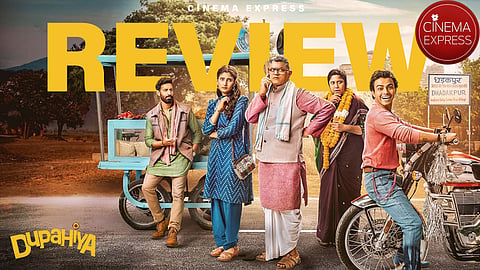Dupahiya series review: A bland, quirky satire that never takes off
Dupahiya(2 / 5)
The story of Sonam Nair’s latest series Dupahiya is set in Dhadakpur, a village that has not witnessed a crime for over 25 years. Not a single case of robbery or petty theft. This sounds like utopia, a different world altogether that few of us are familiar with and that needs to be established from scratch. The world is very important in Dupahiya. The makers of this show, however, do not understand the significance of world-building, mistaking lack of realism for utopia. It operates in a parallel universe where caste doesn’t exist, where cops are more like powerless, lazy pawns. While it had the potential to be a wacky crime procedural cum social satire, the show doesn’t know what to do with its quirky premise, where the fate of a family (and also an entire village) rides on a motorcycle, metaphorically speaking.
Director: Sonam Nair
Cast: Gajraj Rao, Shivani Raghuvanshi, Sparsh Shrivastava, Bhuvan Arora, Renuka Shahane, Samarth Mahor
There is a unique universe in Dupahiya, no doubt, but we see only a few fleeting glimpses of it. Dhadakpur is never established as a living, breathing entity and ends up looking like a collection of quirks. While each new character gets introduced in the show and stands well enough as a screwball figure in their own right, it never feels like they belong to the same community. There is plenty of quirk on the periphery—there’s the much-feared crime figure with a pet owl, which is named Dollar. A quintessential ‘hero’ figure is also a kleptomaniac. The prospective groom and his brother have their own blue-eyed, boy-neglected child rivalry. Amavas (Bhuvan Arora) gets an arbitrary Ennio Morricone-styled theme music whenever he appears on screen. However, the secondary elements strangely get heavier, and the writers end up indulging themselves on these 'sidelines', instead of exploring the central conflict or the main characters. The show makes space for too many characters without having the gravitas to do justice to their pathos. Resultantly, the tension never escalates in terms of the threat to Roshni’s marriage or the village’s reputation.
Samarth Shrivastava plays Bhugol, the black sheep of the Jha family who never got the validation he wanted from his father. He wants to become an actor, or go ‘viral’ but in very particular ways. A scene towards the latter part of the show brings this arc to a beautiful point where Bhugol challenges his self-prejudices and comes up trumps. However, five episodes have passed by when this arc reaches its conclusion, and by then the narrative has half-heartedly chartered into enough territories to keep us emotionally distracted from Bhugol’s coming-of-age journey. Nirmal (Komal Kushwaha) too is an interesting character, an underdog that both suffers from prejudices and yet resents her own father after years of internalising those prejudices. However, Nirmal’s change of heart arrives in a quick-fix manner, courtesy of a small monologue from an empathetic doctor.
Amidst all of the chaos stands out Teepu (Samarth Mahor), a nondescript young man who can be described as the staple ‘hero’s friend’ of this show. However, despite the writers not spending enough time with him, Deepu brings a sweetness to the proceedings that others fail to. He has no big goal, no overwhelming complexes to overcome. He is a simple-hearted man, just trying to be a good friend to Bhugol, a good support system to his ladylove.
Let’s not even delve into the choice where the makers do not even attempt to critique the central conflict, the fact that a marriage could possibly be called off on account of dowry. Dupahiya is not interested in being a social satire. It, unfortunately, also doesn’t have the writing prowess to work as an engaging tapestry of a unique village. There is some wit here, but no energy. The staging is bland. For a light satire, Dupahiya has episodes that are too long and laboriously edited. The show is also aesthetically outdated, barely offering anything new in terms of choices for background music or production design. A lot of the humour drives on English words being misunderstood, only for the character to reply with a botched-up interpretation which probably sounded funny during the script narration. Having said that, the only impressive aspect about the series is its dialogue, which is oozing with a rustic, colourful flavour that belongs to the land it's set in.
The writers neither build a strong emotional base for the Jha family nor lay enough groundwork in terms of establishing their connection with the rest of their village. We never learn of the stakes if the village loses its ‘crime-free’ tag. Roshni (Shivani Raghvanshi) is obsessed with moving out of her village and having a city life—and yet her desires and complexes remain unexplored, even as the show remains centred on her wedding. Banwaari Jha (Gajraj Rao), the family head, has a wound of his own—he has never been allotted a permanent position as a teacher. However, we are delivered this as a bit of information, instead of a poignant chapter of someone’s life. A lot of this show feels lifeless and devoid of energy for the aforesaid reasons. There is a lot happening on the surface, and yet you feel nothing. Dupahiya is actually a criminal waste of a stellar cast that struggles to soar above their poorly etched roles.
When Roshni finally takes a bold step at her wedding mandap, you realise Dupahiya could easily have been a tightly-knit feature film, with sharper focus on its satirical talking points and fewer digressions. In office lingo, this series could have been an email.

